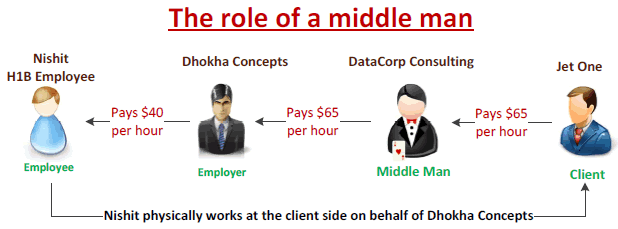Types of H1B Visa Employers
There are many different types of employers in the USA who are looking for the IT talent. And there are many cash cows of IT who would be willing to work and sacrifice important time of their life without knowing the reality of the kind of employer they are going to work for. Whether you are already working in the USA on a work visa or planning to come to the USA, it is very important that you understand the types of employers.
Consulting Employers ( Also known as Desi Employers)
These employers are small-to-medium scale employers, and the company is mostly owned by a person of an Indian or Asian origin. They do not have any in-house software development work to do, but they hire the overseas workers (mostly from India), and sell their services (the expertise) to other American employers in the USA who needs it. The question may arise in your mind Why that other employer (the American employer) wouldn’t do the same thing? First of all, there is a lot of paper work involved in getting the overseas worker; secondly, for American employer it would be an adventure of chartering completely unknown territory. So no American employer is willing to take such a risk… Still don’t get it? Read the example below.
The question may arise in your mind Why that other employer (the American employer) wouldn’t do the same thing? First of all, there is a lot of paper work involved in getting the overseas worker; secondly, for American employer it would be an adventure of chartering completely unknown territory. So no American employer is willing to take such a risk… Still don’t get it? Read the example below.
The better analogy would be that if your wife is pregnant, you don’t go to medical school to learn about gynecology because you know that it is a hassle; instead, you go and have your wife checked by gynecologist to address the gynecological issues. Similarly, when American employers need some expertise on their IT project, they rely on hiring a temporary manpower to fill in that expertise. When an employee is working for a consulting company, the employee is not physically working at the company, instead, employee works at the client side.
For example, Nishit is working for a company called Dhokha Concepts, which means that Dhokha Concepts sponsored the Nishit’s H1B visa. Dhokha Concepts sold the Nishit’s IT expertise to the company called HenWorth; in this case, HenWorth is known as the client of Dhokha Concepts. Nishit is not working physically at the company (the Dhokha Concepts); instead, Nishit works at the client side (at HenWorth). Since, Nishit is not a full-time employee, he is also known as the contractor /consultant/temporary worker at the client side.
Man in Middle or Middle Man
It is not a type of employer; But a major part of the consulting food chain. A majority of consulting companies do not have a direct relationship with the respective client. So the consulting contract passes through the layers in between. Such a layer is known as “man in middle: or “middle man”. Sometime there are many layers between the end employer and the client. Let us discuss it through an example.
Jet One (the American employer) has an urgent requirement for Data Warehouse expert for their IT project. This IT project is expected to last six months. Jet One is a big company, and they have the preferred IT vendor known as DataCorp Consulting. Here, the preferred IT vendor means that whenever there is any temporary manpower requirement, Jet One will ask DataCorp Consulting.
In the case of Data Warehouse expert requirement at Jet One, DataCorp Consulting does not have a Data Warehouse expert waiting for the next assignment, so DataCorp Consulting publishes this job on monster.com and many other job sites. DataCorp Consulting is now flooded with countless resumes and it comes across the Nishit’s resume. They like Nishit’s resume, so Data Consulting requests Dhokha Concepts that they would like to interview Nishit. Finally, after multiple rounds of interview, Jet One confirms to buy the Nishit’s IT consulting services for six months. Hence, in this entire scenario DataCorp Consulting acts as a company in middle, if Nishit’s salary at the client side is $75 per hour, then Data Consulting keeps $10 ( their profit) out of it, and pays $65 per hour to Dhokha Concepts ( the end employer) . Any consulting company would hate any layers in between because these layers just eat up their profit. When there is one or more layers in between the client and the employer (in this case Dhokha Concepts), the employer would usually complain to their H1B employee that we cannot raise your salary, benefits etc.. because there are many layers in between. There is a way to get around, for details, read the salary negotiation techniques.
Any consulting company would hate any layers in between because these layers just eat up their profit. When there is one or more layers in between the client and the employer (in this case Dhokha Concepts), the employer would usually complain to their H1B employee that we cannot raise your salary, benefits etc.. because there are many layers in between. There is a way to get around, for details, read the salary negotiation techniques.
Direct Employers
These are the big time employers like IBM, Oracle, Microsoft, Google, eBay, HP etc.Usually they do not sell your services to other, you are their employee . These employers are really good at offering benefits.
The Comparison between the Consulting Employer and the Direct Employer.
| You may also like: | ||
 |
 |
 |
 |
 |
 |
See Also
 Email this page
Email this page


 (4 votes, average: 3.75 out of 5)
(4 votes, average: 3.75 out of 5)

